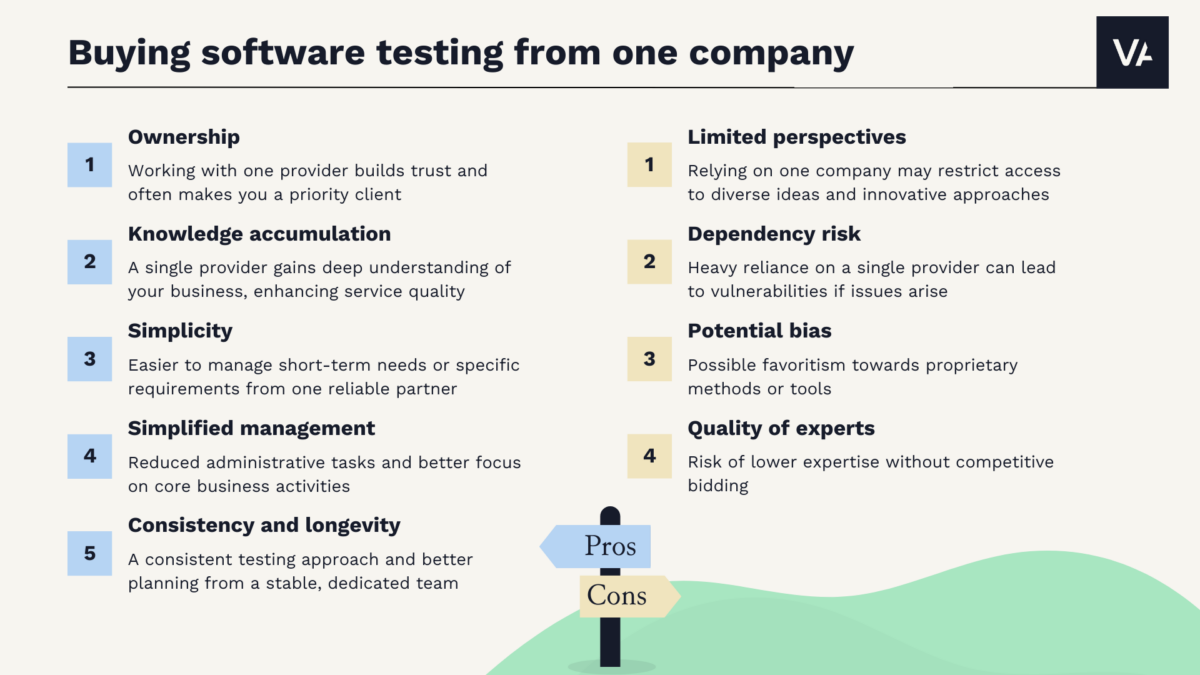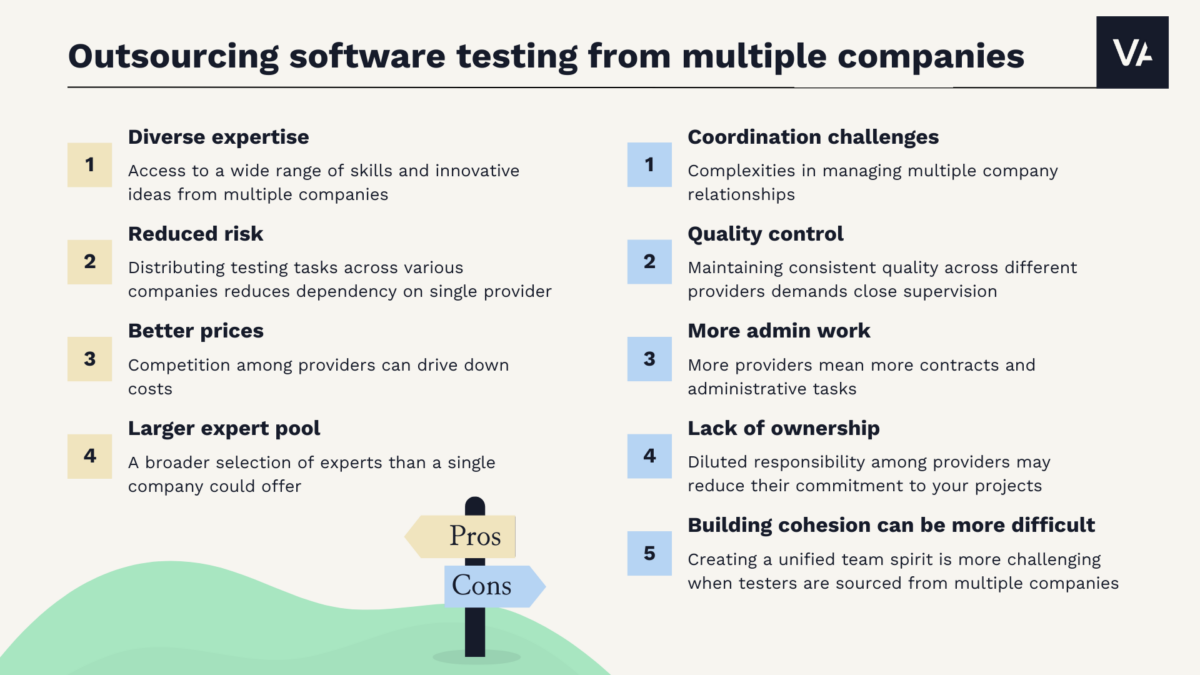Should You buy software testing from one or multiple companies? Here’s what to consider
29.04.2024

In our previous blog we discussed whether you should hire external software testing expertise from the same company that develops your software, or from an independent company. If you’ve decided to rather work with an independent software testing company, next you might wonder whether to work with one company or many.
Next we’ll discuss the advantages and disadvantages of both approaches to help you decide what’s best for you.
Buying software testing from one company
Pros:
Ownership: Trust creates trust. This is perhaps the most important aspect when working with a single service provider. With whatever comes, you can trust your partner doing their utmost best because you are most likely a very important client for them and the collaboration is based on trust that you get the job done.
Knowledge accumulation: When you work with a single company, things tend to last longer which inevitably means that your partner accumulates a great deal of knowledge and understanding of you and your business. Besides time, the knowledge accumulates to one company simply because there are more consultants from that company. Knowledge accumulating to one company can greatly help that company to offer you better service quality. Naturally this is also a risk in case you part ways.
Simplicity: Think about a short term need for a tester with 50% allocation. It can be quite a lot easier if you know you’ll get it from your QA partner instead of having to ask half a dozen companies for offers. Whether your partner has that expertise ready and available or they use their partners, this doesn’t matter to you, you get what you need easily.
Simplified management: Dealing with only one company makes things easier in terms of paperwork and coordination. You’ll spend less time on admin tasks and have more time to focus on your core business.
Consistency and longevity: Working with just one testing company means you’ll get a consistent approach to testing. Testing professionals can plan their work better when they have more certainty of the future. This also enhances the motivation and commitment of individual consultants because they can feel more like part of the team, not having constant fear of their contract ending.
Cons:
Limited perspectives: Depending on just one company might mean you miss out on different ideas and approaches to testing. This could limit creativity and prevent you from exploring new methods.
Dependency risk: If you rely solely on one company and something goes wrong, you could find yourself in a tight spot. Having backup options is important to avoid disruptions to your projects.
Potential bias: A single company might favor its own methods or tools over others, which could affect the quality of the testing and the results you get.
Quality of experts: If you have only one partner and don’t competitively tender your needs, you might end up getting mediocre quality. This is naturally a worst case scenario and if you trust your partner there is no problem. However we wanted to include this to the list because there is a possibility that the vendor might offer you not-their-best experts because they know there is no competition.

Outsourcing Software Testing from Multiple Companies
Pros:
Diverse expertise: Working with multiple companies means you can tap into a wider range of skills and ideas. This could lead to more innovative solutions and better testing outcomes.
Reduced risk: Spreading your testing across different companies means you’re not putting all your eggs in one basket. If one company falls short, you have others to fall back on.
Better prices: Competition between companies could lead to better prices for you. Each company will want to win your business, so they may offer competitive rates. Although, please note that careful tendering process in choosing just one partner might do the same.
Larger expert pool: Even though with the help of their partners, a single company can provide a very competitive expert pool, it still can not exactly match going forward with no restrictions at all.
Cons:
Coordination challenges: Managing relationships with multiple companies can be tricky. You’ll need to make sure everyone is on the same page and working together effectively.
Quality control: Keeping the quality consistent across different companies may require extra effort on your part. You’ll need to monitor each company closely to ensure they’re meeting your standards.
More admin work: Dealing with multiple companies means more paperwork and administrative tasks. This could eat into your time and resources.
Lack of ownership: As mentioned above, ownership is vital in any partnership and thus limiting it, might be nonoptimal. If there are many service providers, the responsibility of one provider is smaller which means that the client, you, are not as important to each provider as you could be.
Building cohesion can be more difficult: If all the testers come from the same company, it is easier to build cohesion for the team. Or in other words, this kind of team gets a slight head start in this section. It might not seem so important but in our opinion you should not underestimate the power of team spirit, nor the difficulty of building it.

Conclusion
We believe this was pretty much a tie. There’s approximately as many pros and cons in both. Moreover, the pros and cons listed are not obvious truths but more dependent on the service provider and situation. However, here are the main points to sum it all up.
If you work with only one software testing company:
Pros: You build trust and get consistent testing. There’s less paperwork, and the team feels more like part of yours. With strong ownership the company most probably bends over backwards to be the best partner possible. Moreover, one company can plan, handle and improve your quality holistically.
Cons: You might miss out on new ideas or get biased ones. You are dependent on one company which increases risks. You could also end up with mediocre experts.
If you work with multiple software testing companies:
Pros: You get a larger expert pool with more diverse expertise, risks are reduced and you might find better prices.
Cons: Lack of ownership means that you are not as important to the service providers as you could be. Also, coordinating multiple companies can be tricky. You’ll need to monitor quality closely and handle more paperwork.
VALA can help you in both cases
What comes to software quality, we are here to help. If you are looking for a software quality partner, there are few as comprehensive as we are in Finland.
- Blog |
- QA |
- Software testing




